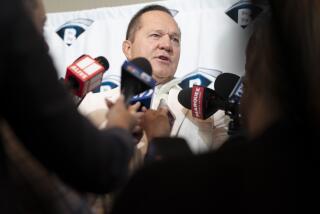Baseball’s Biggest Nightmare: Strike Five
- Share via
NEW YORK — Under the idyllic sun of spring training, no one wants to think about it, much less talk about it. At a time of hope, it’s baseball’s worst nightmare: Strike Five.
“The newspapers have been filled with threats to do that,” says Richard Ravitch, the owners’ labor negotiator.
“You don’t confront that until you have to, and we’re a very long way from doing that,” players’ association head Donald Fehr says.
The collective bargaining agreement signed after a 32-day lockout in 1990 expired last Dec. 31. While owners agreed not to lock out players this year, the union is considering a protective strike during the second half of the season to prevent owners from unilaterally implementing a salary cap.
“Worrying about impending crises is something we’d rather not get into now,” says Milwaukee Brewers president Bud Selig, chairman of the ruling executive council. “There’s so much optimism, the spring is filled with that, you hate to see any negative talk now. We have a lot of momentum building, we’re coming off a great year attendance-wise, we have the new stadiums, the expanded playoffs.”
Fehr has spoken to every major league team in Florida and Arizona this spring, warning players that a strike is a “real possibility.” Players want to continue the system that pushed the average salary $1,076,089 last season.
“You’d like to think this might be a year we could avoid problems, but it may not work out that way,” Atlanta pitcher Tom Glavine says. “It doesn’t sound good, from what I’ve heard.”
There have been seven work stoppages in a 22-year span: strikes in 1972, 1980, 1981 and 1985, and lockouts in 1973, 1976 and 1990. Owners are insisting that players agree to a salary cap, and that’s likely to cause a confrontation.
Management financial documents show collective profits dropped to $22.2 million in 1992 from $99 million the previous year, and Ravitch predicts a $140 million loss when 1993 is added up.
“It seems like they’re saying a lot of the same things they’ve said before,” Todd Zeile of the St. Louis Cardinals said. “I guess we’d hoped to hear something more after so long.”
Owners, deeply divided into labor hawks and doves, voted in December 1992 to reopen the collective bargaining agreement’s key components. After two negotiating sessions the following month, they recessed talks to discuss a new revenue sharing plan themselves.
In January, after a year of internal debate, owners finally passed a revenue sharing plan but made it subject to the union agreeing to a salary cap. Fehr says that for players to seriously consider a cap, owners must both show financial need and agree to share decision-making.
“The owners have reopened; they’ve had 15, almost 16 months to get ready to bargain after they reopened,” Fehr says. “As of now, we have no indication when or if the owners will make a proposal or tell us what they want to do other than utter the word salary cap. It appears it will be a long negotiation and a difficult one.”
If players allow the season to finish without an agreement, owners could declare they’ve bargained to an impasse, then impose a salary cap that could gut free agency and salary arbitration next winter. In that scenario, players couldn’t take any action until spring training 1995.
“Nobody cares if you strike in November,” Fehr says. “It would therefore be doubtful that the union would very easily put itself in that position.”
Not much bargaining is taking place. Ravitch wants the union to give cost certainty and saw how much it will cost owners to play ball in 1995. Fehr wants owners to make a proposal.
“I can’t predict what’s going to happen,” Ravitch says. “I hope they’re serious, good faith bargaining sessions and I expect to do serious work with Don and his colleagues.”
If so, they would be the first in baseball history. The historical pattern is for bargaining to begin only after one side sets a deadline for a work stoppage.
Ravitch says he doesn’t think owners would avoid a confrontation by extending the current agreement for one more offseason.
“I expect we’ll have a contract by the end of this season,” he says.
Meanwhile, players and their agents are preparing for another war.
“I’m building a new house,” Gregg Jefferies of the Cardinals says. “If there’s a work stoppage, I’m going to stop building that house.”
More to Read
Go beyond the scoreboard
Get the latest on L.A.'s teams in the daily Sports Report newsletter.
You may occasionally receive promotional content from the Los Angeles Times.










